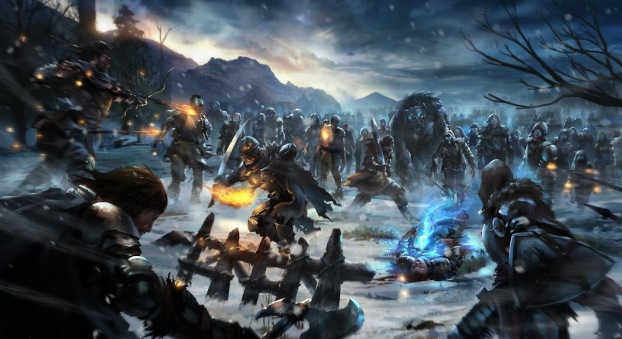You only need to have heard of works like A Song of Ice and Fire, The Grim Company or Prince of Thorns to know that the current trend in fantasy is to practically brutalise your heroes before letting them win (or die). Perhaps influenced by Hollywood and the trend in society towards ‘gritty’ heroes and tales, the fantasy genre has more than followed this trend; it has shaped it.
If you had asked anyone if they had heard of Game of Thrones before the TV series made such a huge splash, they’d probably have just stared at you blankly. Nowadays, the series is everywhere and its followers encompass fantasy fans and ‘average joes’ alike. It seems people really love the brutal ‘fantasy realism’ (is that even a thing?) of the show and just can’t get enough bloodshed, betrayal and incest. Other TV shows hold a similar appeal (I’m looking at you, Breaking Bad).
Gritty, dark, grimdark, grim and err… horrible?
Fantasy likes to invent different names for things that are practically the same (in fact, all genres do). It seems that every day more and more authors are being included in the mentions when discussion about ‘grimdark’ takes place. Joe Abercrombie and Richard Morgan are two of the first to have been grouped under this banner. But just the other day I saw Scott Lynch referred to as ‘grimdark’. Hmm, I’m not so sure.
Genres and sub-genres change all the time and gritty fantasy is no exception. For his time, Tolkien’s writing was just as gritty and complex as perhaps George R. R. Martin’s is now. Perspectives change over time and, the truth is, putting your characters through hell is an essential part of many stories, not just the ‘gritty’ ones.
Our heroes now are almost anti-hero in nature. We’re meant to root for the thief, the assassin and the mercenary. Where are our knights of justice, our superheroes? Well…
The ‘Dark Knight’ Problem
When Christopher Nolan’s Batman reboot, Batman Begins, stormed onto the silver screen back in 2005, all the talk was on how superhero movies had been made relevant once again. But let’s not forget we had Spider-Man back in 2002; also successful, also with elements of darkness. For me, at least, it feels like Chris Nolan kicked off this ‘new’ idea of gritty, grounded superheroes and cemented it into the public’s subconscious. Now it’s led us down the road where Superman no longer has red briefs, Batman can fight no villain with supernatural abilities and Captain America’s mask must take on the design of a helmet, just so it’s all believable.
But they’re god-damn superheroes! Do they need to be believable?
Yes and no. Yes, the audience needs to be able to relate to them. No, every detail doesn’t need to be scientifically consistent. We don’t really care how Batman’s grapple-gun actually works, or how he has a powerful enough sonar in his suit to summon clouds of bats, so long as it looks cool and is at least consistent within the fictional world.
So… Fantasy?
OK, so we’ve established what gritty/grimdark is, but how does it fit into the world we’re concerned with: the world of fantasy fiction? Well, it turns out the fantasy genre is in the grip of the concept of ‘gritty’ right now. Namely, a drive for realism (and the occasional penchant for visceral gore). This trend has been intensifying for a long time now and I personally believe we’re reaching critical mass. Joe Abercrombie’s work was pretty violent and dour, giving you a sense of hopelessness as you read it. Following on from that was Mark Lawrence with Prince of Thorns and then the latest entry in the ‘grimdark’ arena is Luke Scull. With each new work, things get darker, more gory and far more grim. It’s only a matter of time before readers decide they want something fresh, something upbeat.
I think a great way to wrap this article up is with a list of recommended reads, of what I consider to be some of the best gritty fantasy out there. What you need to understand is that I am a huge Abercrombie fan and I do enjoy the odd gritty tale or two. Lately, I’ve been exploring other works that you wouldn’t really classify as ‘gritty’, because I’m growing tired of the similar style and atmosphere in my fiction. I want to see a return to the great epics of old, but with a decidedly modern twist. It’s something I hope to at least try with my own writing.
The ‘Gritty Is Good?’ Reading List
- The First Law Trilogy (Joe Abercrombie)
- The Lies of Locke Lamora (Scott Lynch)
- Prince of Thorns (Mark Lawrence)
- Waylander (David Gemmell)
- A Song of Ice and Fire (George R. R. Martin)
- The Black Company (Glenn Cook)
- Malazan Book of the Fallen (Steven Erikson)
- Acts of Caine (Matthew Stover)
- The Darkness That Comes Before (R. Scott Bakker)
- The Dresden Files (Jim Butcher)
Honourable Mention: The Engineer Trilogy (K. J. Parker)Can this be characterised as gritty? I’ll leave that for you to decide, but be sure to check this one out. K. J. Parker is somewhat under-appreciated and deserves a lot more attention.




One thought on “Gritty Is Good?”